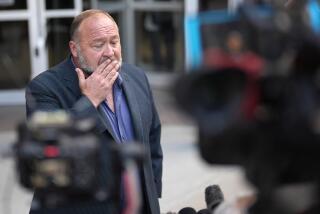Rep. Cox Still a Defendant in First Pension Suit
- Share via
SANTA ANA — U.S. Rep. Christopher Cox lost his bid to be removed totally from a lawsuit accusing him of helping to keep the First Pension scandal operating 10 years ago, according to an Orange County judge’s preliminary rulings Thursday.
However, while Superior Court Judge Francisco F. Firmat appeared to give investors a boost in their class action, he also issued a preliminary ruling that removes the Newport Beach Republican from another lawsuit.
Firmat is expected to make a final ruling today on whether Cox will remain a defendant in the investors’ lawsuit, which stems from the $136-million fraud perpetrated by William E. Cooper, First Pension’s founder. Cooper, once a major Orange County GOP campaign fund-raiser, is now serving 10 years in prison for swindling investors out of their retirement savings.
In the investors’ class action, the judge threw out two allegations--for malpractice and for fraud by active concealment--but gave plaintiffs 30 days to amend the pleadings to try to overcome legal objections. He overruled Cox’s effort to dismiss four other claims, including fraud, misrepresentation and aiding and abetting a fraud.
In a second lawsuit, brought by First Pension’s court-appointed receiver, Firmat issued a preliminary ruling to throw out claims against Cox. The judge, however, held back a final ruling until he reads new cases cited at the hearing by lawyers.
The legal skirmishing represents the first effort by Cox and other defendants in the cases to get the charges dismissed. Also seeking to be dismissed were the Coopers & Lybrand accounting firm, former state Corporations Commissioner Gary Mendoza and the law firm of Latham & Watkins, where Cox and Mendoza worked on a First Pension securities offering in the 1980s.
While they deny any wrongdoing, the defendants have yet to file formal responses to the lawsuits. “The question is whether the plaintiffs can even make an allegation,” Cox’s lawyer, George Link, said. “We’re not looking at the merits yet.”
It was only last-minute pleading by Link that kept Firmat from making his order final Thursday. The judge will hear more arguments this afternoon before making his decision.
Link said that a “good chunk” of the investors’ case was thrown out and that he doubts the plaintiffs can fix the defects in their pleadings.
But Michael Aguirre, lawyer for the investors, said his clients are pleased with the preliminary rulings. “They’ve been waiting a long time, and they’re starting to see some justice in the case,” Aguirre said.
First Pension and related companies collapsed in April 1994, under the weight of a scam that left 8,000 investors with losses totaling $136 million.
Cooper has admitted that he had been swindling investors out of their retirement savings for a dozen years. In February 1995, a federal judge sentenced him to prison and ordered him to repay $73.1 million.
His two cohorts, Valerie Jensen and Robert Lindley, also were given prison terms for their roles in what amounted to a giant Ponzi scheme that misled clients into investing in nonexistent mortgages and took money from new investors to pay back earlier ones.
The plaintiffs accuse Cox, Mendoza and Latham of helping to rearrange a corporate structure to hide Cooper’s wrongdoing and to communicate misleading information to investors and regulators by omitting information about prior losses as well as details about the investment portfolio.
Two letters to investors in late 1984 and early 1985 also failed to mention a pending Securities and Exchange Commission investigation into First Pension and a sister company, VestCorp, the suit contends.
“Cox was a securities law expert,” Aguirre said in an interview. “He knew the legal significance of what he was doing much more than the others.”
The suit alleges that Cox and other Latham lawyers knew that Cooper and the others had been involved in wrongdoing, including misappropriation of funds by Cooper. The lawyers failed to notify investors, the suit alleges, because Cooper feared a “run on the system”--demands by investors for the return of money that the company no longer had.
“Once engaged in the concealment of the fraud, all the defendants got caught in a vicious circle of telling falsehoods to cover-up prior falsehoods,” the suit contends.
But Link, the congressman’s lawyer, pointed out that while Cox had worked on a VestCorp public offering from 1984 to early 1986, he had left the law firm more than a year before the offering was revised, approved and sold.
“Due diligence isn’t done until the end of the process, just before the offering goes public, and he simply wasn’t there then,” Link said.
He also asserted that the law firm’s job was to handle only one offering, which resulted in sales of only $5 million. The complaints don’t allege that anyone lost money from that offering, he said.
“This transaction may have been the only transaction that First Pension did that was done properly,” Link said.
Link asserts in court papers that the plaintiffs took “enormous logical hurdles” to allege such “preposterous legal conclusions” as an accusation that Cox should be responsible not only to those investors in the $5 million pool but also to all investors in other pools sold and administered by VestCorp and First Pension.
More to Read
Inside the business of entertainment
The Wide Shot brings you news, analysis and insights on everything from streaming wars to production — and what it all means for the future.
You may occasionally receive promotional content from the Los Angeles Times.










